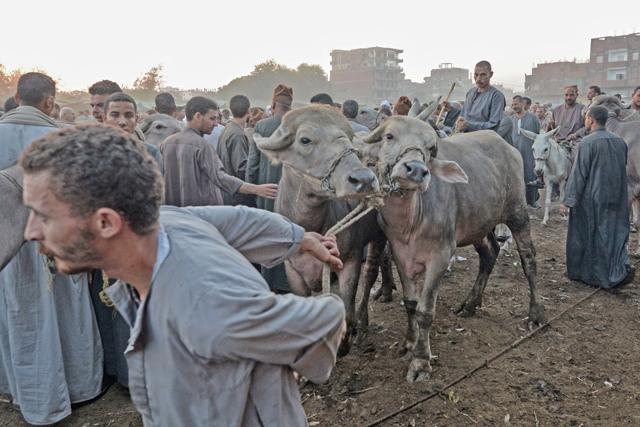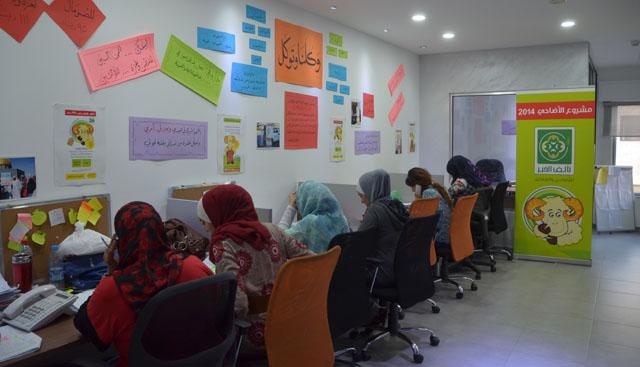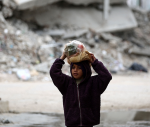You are here
In inflation-hit Egypt, Eid sacrifices are a luxury
By AFP - Sep 04,2017 - Last updated at Sep 04,2017

Egyptian cattle traders gather at the Ashmun market in Egypt's Menufia Governorate on August 30, as they sell livestock ahead of the annual Muslim Eid Al Adha holiday when custom requires the faithful to make a sacrifice (AFP ph§oto)
MENUFIA, Egypt — The cattle traders in the Ashmun market, north of the capital Cairo, jostled to lure customers into buying a buffalo or a sheep for Eid Al Adha, the annual Muslim holiday when custom requires a sacrifice.
But this year, with inflation in Egypt hitting record highs, customers seemed more interested in gawking at the cattle than buying any ahead of Friday, the first day of Eid Al Adha.
"Last year there was more business. This year, no one wants to buy cattle because of the increased prices," said one trader, Mohammed Masoud.
The cost of everything has gone up in Egypt since the country floated the pound late last year — decreasing its value to the dollar by half — and raised fuel prices.
Masoud fed his livestock fodder that cost 2.5 pounds ($0.14) a kilogramme before the currency was floated. It now costs him seven pounds.
"A calf that cost 15,000 pounds last year now costs 30,000," he said.
Eid Al Adha is one of the holiest days in the Islamic calendar when the major pilgrimage takes place in Mecca, Saudi Arabia.
To commemorate Abraham accepting to sacrifice his son to God only for him to be provided with a ram instead, many Muslims sacrifice a sheep or a cow.
Meat has always been a luxury to many in a country where poverty is rampant, but the new prices are putting off even those who had purchased cattle in previous years to sacrifice on the first day of Eid and distribute the meat among family and the needy.
In July, annual inflation hit 34.2 per cent according to official figures.
That follows a series of austerity reforms linked to a $12 billion International Monetary Fund loan that Egypt, hit by years of tumult, desperately needs.
"Even if people want to buy meat, a kilogramme costs 130 pounds," said Nasser Abou Kila, who had come to the market in the province of Menufia after spending two weeks trying to find a better deal elsewhere.
Customers feel impact
Cattle traders say they were especially unlucky this year with the inflation compounded by an outbreak of foot-and-mouth disease, which killed off cattle and raised the prices of the ones that survived.
Butchers who buy from large markets, such as the one in Ashmun, also have to factor in increased transport prices.
"Last year it cost 100 to 150 pounds to transport a head of livestock to Cairo. This year it costs 400," said one butcher, Said Masoud.
"There is no comparison with the last Eid Al Adha," said another butcher in Cairo who gave his name as Hassan.
"It was 85 pounds for a kilogram then and now it's 150 to 160."
Customers say they are feeling the impact.
"To buy two kilograms for two days, you have to pay 300 pounds, and that's just for meat," said Naglaa Rajab, a housewife in her 30s.
The government of President Abdel Fattah Al Sisi says it has no choice but to undertake the tough economic measures.
But it is mindful of the strain the reforms are putting on Egyptians, many of whom can barely scrape by every month.
Ahead of Eid Al Adha, the agriculture ministry said it would offer about 50,000 heads of cattle at cheaper than market price, at a discount of between five and 10 pounds per kilogramme.
"We're keen that every citizen should have the right to reserve a head of cattle for sacrifice," said ministry spokesman Hamed Abdel Dayem.
But in a country where 28 per cent of the 93 million population live under the poverty line and with inflation squeezing the middle class, less Egyptians will be buying livestock.
"Whoever sacrificed a cow last year will sacrifice a sheep this year," said Rajab. "And whoever sacrificed a sheep last year won't be able to afford anything this year."
Related Articles
AMMAN — The Agriculture Ministry has finalised preparations for Eid Al Adha, a ministry official said on Monday, adding that a sufficient su
Instead of driving all the way to a stockyard near Amman to choose a sheep and have it sacrificed for Eid Al Adha, Nadira Ahmad just made a phone call to a specialised company that will do it for her.
AMMAN — Butchers and sheep pen owners on the fourth day of Eid Al Adha complained of lack of demand for sheep this year compared to previous


















